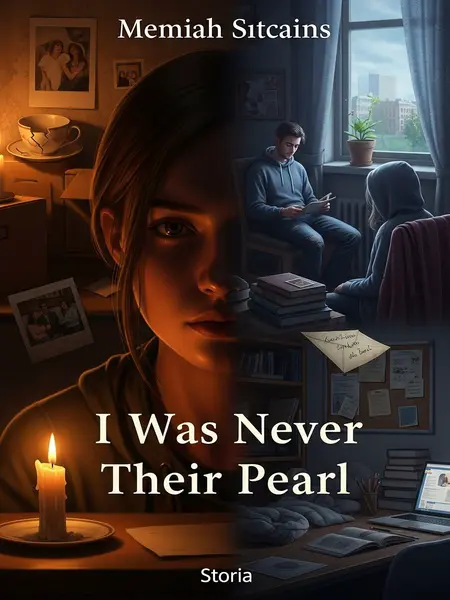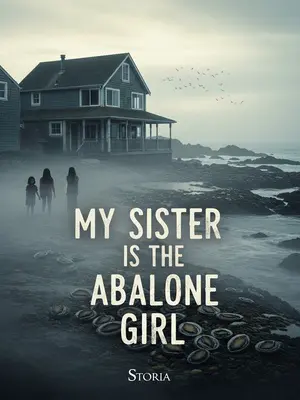Chapter 1: The Girl Who Wasn't a Pearl
When my dad remarried, I got a stepmom—and a whole new family, too. This isn’t some distant memory or someone else’s story; it’s mine. Every detail is as sharp as sunlight on a hot summer day.
I remember the first time my stepmom talked about family. She said, “Girls with brothers are cherished, like pearls in the palm of your hand.” But I was never a pearl. Not in anyone’s hand. I was just mud, crushed under a thousand burdens, barely able to breathe. Her words echoed in my ears for years—a lullaby, but one meant for someone else’s daughter. Funny, huh?
Sometimes I’d stare at my reflection in the bathroom mirror. I’d try to imagine myself as that treasured pearl, but all I ever saw was a girl with tired eyes, hands rough from chores, and a heart that already knew way too much about being alone.
I was born unlucky, with bad luck hanging over me from the start, always the subject of gossip. When my mom gave birth to me, she suffered a rare complication. Even with all their money, her life couldn't be saved. I was born on a muggy July night, and my birth cost my mother her life. Folks in Maple Heights said I was bad luck, that I brought trouble.
Even now, I can hear the whispers on sticky summer nights—neighbors fanning themselves on their porches, trading stories over the hum of cicadas: “That Mariah girl, she’s the reason her mama’s gone.” I grew up half-believing them, half-hoping there was something else to blame. Was it really my fault?
Maybe it was luck. My parents never really loved each other anyway. At least my dad didn’t blame me or send me away. Then, one day, Dad brought home a new wife. She had a son five years older than me, and she was pregnant again—with my dad’s child. The neighbors came to congratulate us: “Now it’s really a complete family, with both a son and a daughter.”
I remember standing in the kitchen, sticky with summer heat, watching them shake my dad’s hand and slap his back, their voices a little too loud, like they were trying to convince themselves. I kept my eyes on the floor, counting the yellowed linoleum tiles.
My stepmom smiled awkwardly. “My husband’s lucky—now he’s got both a son and a daughter.”
She said it with a laugh that didn’t quite reach her eyes, her hand resting protectively on her belly, as if she was already bracing herself for what was to come. I wondered if she was scared, too.
A few months later, she gave birth to my younger brother. I thought I was part of the family, too. That maybe I’d be loved the same. But I was wrong.
I’d peek into the nursery, watching her rock my baby brother, humming lullabies I’d never heard. Sometimes, I’d imagine her arms around me, just once. But the door always stayed closed. Always.
My older brother and younger brother were both my stepmom’s biological kids, and they never seemed to have any trouble. I never dared to compete with my brothers for anything. My stepmom always said, “Your brother’s the sensible one, so if there’s a problem, it’s gotta be your fault. And your little brother’s just a kid—stop picking on him.”
There were days I’d bite my tongue so hard it hurt, just to keep from arguing. I learned early: in our house, silence was safer than speaking up. Better to keep quiet and disappear.
Whenever the family bought fried chicken, Mom would divide it up. There were two drumsticks—one for my older brother, one for my younger brother. The veggies and leftover broth at the bottom of the pot were for me. “You love chicken soup best, right? It’s got all the flavor.”
Sometimes, I’d watch the oil glisten on my brothers’ plates, the smell making my stomach ache. I was starving. I’d force a smile and nod, pretending the soup was my favorite part, swirling the wilted greens with my spoon.
Later, I started school. My brothers could sleep in past seven, but I had to get up before dawn. My stepmom said girls studying was pointless, that being sweet and well-behaved was what girls were supposed to do—just like my name, Mariah.
I’d sit at my desk in the early dark, watching the sun creep over the horizon, practicing my cursive by the weak light. The lamp barely worked. Sometimes, I wondered if being well-behaved meant never wanting anything for myself.
I had to cut grass for the goats at the cemetery behind town—there was more grass there, and it saved ten minutes. Pig feed couldn’t have too much cornmeal; it wasted money... My older brother used to sneak out and help me. But the day my stepmom caught him, she hit him hard. She called him a traitor—said he was siding with an outsider. After that, I was on my own.
The cemetery always felt heavy and quiet, the air thick with dew and ghosts of memories I didn’t have. I’d move quickly, heart pounding, sometimes humming just to break the silence. It made me feel less alone. I missed my brother’s quiet company, but I understood why he stayed away.
Most kids love birthdays, but I dreaded mine. My birthday was the anniversary of my mother’s death. Right in the middle of July. Go figure. My older brother’s birthday was just a week before mine. So every year, I tagged along with his. My stepmom would buy a cake; my brother would make a wish and blow out the candles. I would secretly save those candles, light them again when no one was around, and blow them out by myself.
I’d sit on the back steps, lighting each candle one by one, whispering wishes into the dark. Sometimes I wished for a real family. Sometimes, just for someone to notice me. Was that too much to ask?
Later, on my mother’s death anniversary, my stepmom wouldn’t let my dad go to the cemetery. She said visiting graves during the summer brought bad luck to the whole family. I cried and resisted. My dad even took a belt to me: “How did I end up with such a selfish kid as you? Not only did you kill your mother, now you want to harm the whole family? What, are you here to collect what we owe you?”
His words stung worse than the belt. I pressed my face into my pillow that night, wishing I could disappear. The house seemed colder after that, like even the walls were angry with me. I was alone. Completely alone.
It was still my stepmom who stopped him. I never really understood what their game was. Just like I never really knew if I was truly born under a bad star.
Sometimes, I’d lie awake, listening to the creaks of the old house, wondering if fate really had it out for me. Or maybe I was just born in the wrong story. Who knows?
When I cut grass at the cemetery, I always felt like I could see my mother. Before sunrise, with the mist swirling around, she would hold me tightly in her arms. Sometimes I wished I could just go with her. Wouldn’t that be easier?
The mist felt like her hands on my shoulders, soft and cool. I’d close my eyes and pretend she was there, humming a lullaby only I could hear. The ache in my chest would ease, just a little.
Just a little.
The glaring sunlight always ruined my meetings with my mother. I didn’t dare feel resentful. I didn’t dare fight for anything—not with my sensible older brother, not with my mischievous little brother. I grew up in days like these.
Each morning, as the sun burned away the fog, I’d wipe my eyes and steel myself for another day. I learned to move quietly. To disappear.
After my brother took the SATs, I was in my first year of middle school. He gave me all his notes and books. My stepmom scolded him for being foolish, saying my younger brother in elementary school needed his help more than me, a girl. My brother talked back: “Do you really think your darling son is studious? He’s in second grade and can barely add.”
I watched the argument from the hallway, clutching the battered textbooks to my chest. My brother’s words were like a lifeline tossed across a river I was too scared to cross. I held on tight. I was too scared to cross that river.
My stepmom shot me a sideways look. She couldn’t hit my grown-up brother anymore. “What’s the point of girls studying? After middle school, you should get married.”
Her voice was sharp, final. I kept my head down, staring at the floor, wishing I could disappear.
My brother didn’t argue. He was the scholarly type. He pulled me aside and quietly promised that as long as I wanted to study, he’d support me. Then he went to college out of state and only came home for a few days every six months. I envied him. I wanted to escape, too. So I studied even harder.
His words replayed in my mind every night as I did my homework by flashlight. The dark made it easier to dream. I dreamed of following him, of escaping Maple Heights, of finding somewhere I belonged.
On the day of my high school entrance exam, Dad was busy with work and didn’t come; my stepmom, of course, didn’t either—she was probably hoping I’d fail. The entrance exam lasted two full days. After the last test, the school gate was packed with parents picking up their kids to celebrate. I bought myself a turkey sandwich from the corner deli for the first time.
I remember the smell of fresh bread and cheap mustard, the weight of the sandwich in my hands. I sat on a stone post, swinging my feet, watching happy families walk by. For a moment, I felt almost normal. Almost.
I sat on the low wall outside school, took a bite, and my brother rushed over, out of breath. He smiled and patted my head. “Did you do well?”
His presence was like a sudden burst of sunlight. I needed that. I grinned, feeling lighter than I had in weeks.
I felt good about it, but I just shrugged. “I don’t know if I’ll get to keep studying.”
He nudged me, his gold-rimmed glasses sliding down his nose. “If you pass, you have to keep studying. Didn’t I say I’d support you? Don’t eat that sandwich, let me take you out for a real meal.”
I hesitated, clutching the sandwich, but his insistence made me laugh. It felt good to be wanted. Even just for dinner.
His promise comforted my always-anxious heart. He took me out for steak—it was my first time eating steak. He cut it for me and bought me a fresh-squeezed juice. On the way back, he told me, “Girls should study hard. It’s your only way out. Do you know why I went so far away for college?” He paused, looking out the window. “Only by getting far away can you really escape this place. I don’t even know what I’m doing it for—after all, Mom was good to me. But I still have to live the rest of my life for myself.”
I chewed slowly, savoring every bite. I didn’t want the meal to end. I let his words sink in. That night, for the first time, I let myself believe I could have a future.
I replayed his words in my heart countless times. He didn’t go home, just went straight back to school by bus. When we parted, he gave me a hundred bucks. Back then, a hundred dollars could support a college student for more than half a month. He told me again and again to hide the money and not let my stepmom find out. “You need it for food. You’re still growing.”
I hid the bill in the lining of my pillow, checking every night. I was scared she’d find it. It felt like a secret pact, a tiny rebellion against the world.













